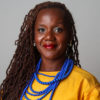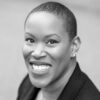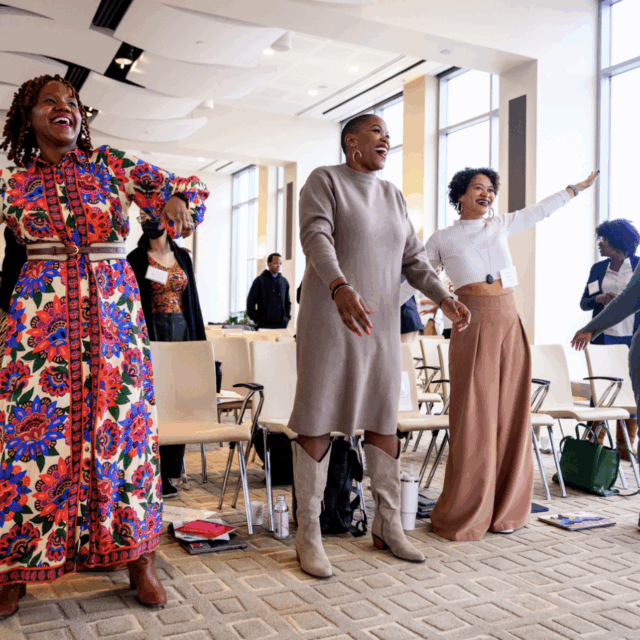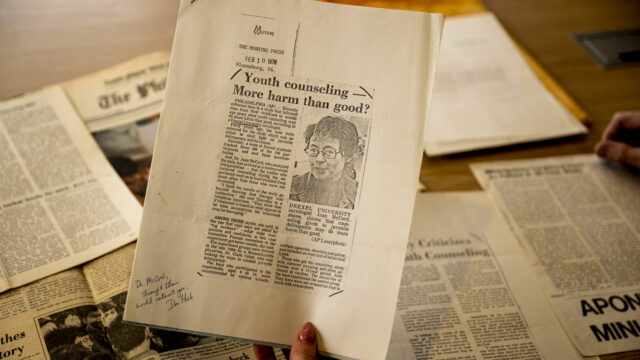The Africana Studies Program at CSSH hosted its third annual bell hooks symposium in early February, two months after the anniversary of hooks’ passing. The theme “Black Feminist Worldmaking” held space to collectively celebrate and reflect upon the legacy of the revolutionary writer, teacher, and feminist, and the significance of her work for future generations.
Régine Jean-Charles, director of Africana studies, dean’s professor of culture and social justice and professor of Africana studies and women’s, gender and sexuality studies, once again served as host of the symposium. She opened the event by contextualizing Octavia Butler’s quote that was featured on the program of the event: “There is nothing new under the sun, but there are new suns.” Professor Jean-Charles says that “Butler’s incandescent ability to convey how characters trapped in unlivable worlds search for and find new suns is, to me, a visionary description of worldmaking. Our 2024 symposium takes on this theme at a time when the need for us to search for and find new suns seems particularly urgent.” She noted the importance of the symposium beginning with the lower case “s” to signify the distinction between Black feminist thinking and worldmaking and typical academic literature.
AK Wright, inaugural post-doctoral Black feminism fellow of the Africana Studies program, curated this year’s theme of worldmaking. In their eyes, this theme allows “ those invested in Black feminism to imagine, dream, and build our visions. Black feminism encourages us to engage complexity and nuance hence we question the role of digital and speculative sites as areas of liberatory practices, understanding them both as limiting and groundbreaking, and everything in between.” Professor Wright began the morning by leading the group in an embodied spirit activity. By setting intentions for our spirits and bodies as we moved through the symposium, they called attention to the importance of leaning into ourselves and bodies as a “whole”, as hooks put it. They lead the group through breathing exercises and body movements to help participants feel more in tune with their physical self. This, to Professor Wright, is the essence of hooks philosophy–engaging with ourselves in the fullest sense and allowing us to connect more deeply with our bodies and others.
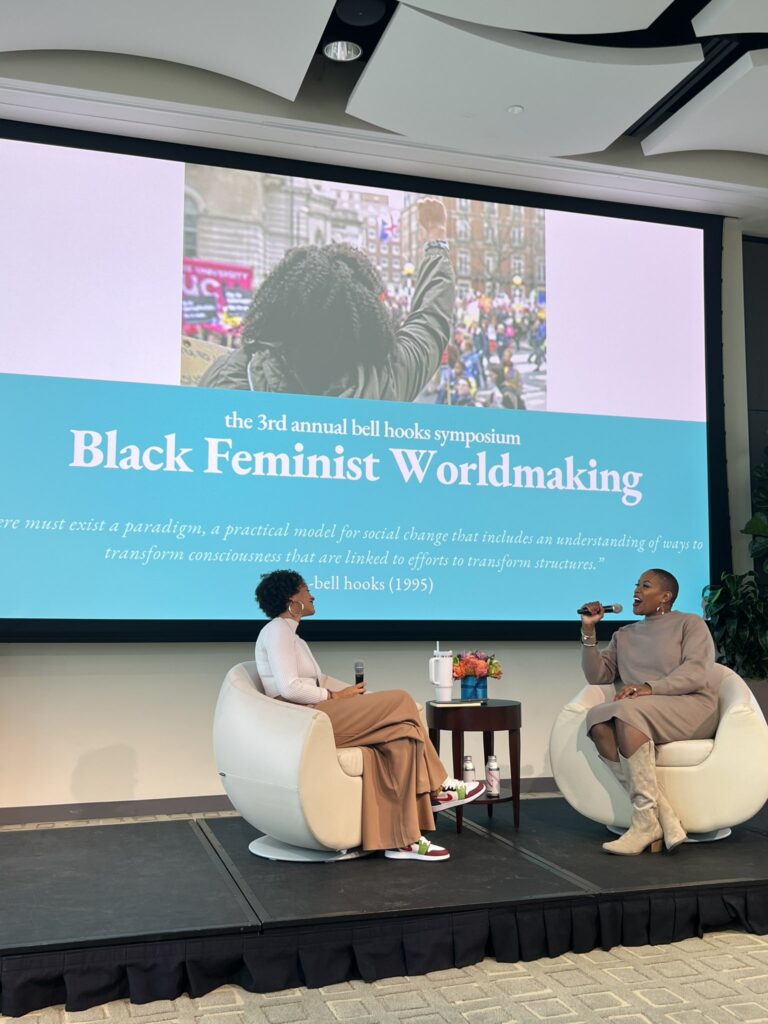
Following Professor Wright was keynote speaker Catherine Knight Steele (left), Associate Professor of communication at University of Maryland. With the conversation moderated by Meredith Clark (right), associate professor in the College of Media and Design, Professor Steele spoke of creating new worlds within the one we already exist. “When we have the capacity to create spaces, like labs, centers and even classrooms, that we have been granted this position of authority, we’re in this small space where we can create a little bit of a different world.” In true hooks’ fashion, Professor Steele stressed the importance of teaching others the very tools that were built against the oppressed to create a world where we can transgress these barriers.
The symposium’s first panel, On the Horizon, was moderated by Serena Turner, a Northeastern undergraduate student studying Communications with a minor in Women, Gender, and Sexuality Studies. First on this panel was Tiera Tanksley from the University of California, Los Angeles. Professor Tanksley’s scholarship is aimed at understanding the ways in which normalized technologies have impacted the lives and schooling of Black youth. She specifically focuses on debunking the myth that technology is an inherently neutral, non-political aspect of society, and that it in fact, often has the same racial biases that its creators do. This, to Professor Tanksley and many experts, have detrimental consequences on the livelihood of Black youth and the education they receive. Professor Tanksley’s work is centered around the creation and integration of new technologies to combat these biases, and promote Black youth wellness and success.
Jaidan Inniss, a Northeastern undergrad pursuing a combined degree in Media & Screen Studies and Africana Studies, spoke to the importance of revolutionaries like bell hooks and the weight their words carry. Inniss shared intimate stories of a world where pain and suffering do not exist through writing. They shared their original poem, ‘Black Joy’.
Black joy will find the most fertile ground.
Jaidan Inniss
You have tried to bury me
but I am not dead,
I am the seed.
I am not a casualty of the storm.
I am the blossom
that rises defiantly through the cracks in the pavement.
I am the mighty oak.
Following Inniss on the panel was Ashon Crawley from the University of Virginia, who delivered a compelling presentation on Art Worldmaking. His presentation delved into the profound impact of the AIDS crisis, highlighting the societal and institutional neglect, particularly evident within pentecostal churches, towards queer men facing the disease and how this has inspired his work. Drawing from his background as a visual, sound, and performance artist, Professor Crawley incorporates elements reminiscent of black pentecostal traditions—such as praising, clapping, and dancing—into his own artistic expressions. Through a fusion of these practices with cutting-edge technological tools like augmented reality, Professor Crawley posits that these creations serve as a form of worldmaking.
Nicole Aljoe, Professor of English and Africana Studies, followed Professor Crawley on the panel, offering an insightful exploration into reimagining data, narratives, and archives. Her work centers on dismantling the prevailing framework that silences Black voices and narratives, often perpetuated through violent means of categorization and concealment in history. Professor Aljoe advocates for a communal approach to history, one that acknowledges and embraces the richness of Black experiences. Through initiatives like the ECDA (Early Caribbean Digital Archive) that she spearheads, Professor Aljoe works to digitize and promote histories that have been historically marginalized. These multigenerational and multiracial endeavors aim to make history accessible to a wider audience. Professor Aljoe underscores the importance of inclusivity, rooted in Black feminist ideologies, in uncovering and sharing these narratives. She emphasizes, “In addition to collecting these items, they are grounded in and inspired by Black feminist ideologies, which of course means being inclusive. Not only uncovering and making accessible this history, but also making sure that history is not walled off so a variety of folks can engage in this archive.”
Chamara Moore of the City University of New York opened the second panel of the evening, Dreaming & Speculating. They underscored the significance of Black feminist worldmaking and healing, while also acknowledging the weight and gravity inherent in engaging with histories and contexts often marked by violence, danger, and trauma. For Professor Moore, the very act of imagination and world building offers a means of healing from our often challenging reality.
“Black femme embodiment is more than just physical embodiment. It’s a methodological practice, not unlike writing, theorizing, or even the act of queering itself. What, then, does it mean to world build from this point of entry? Reading and writing, black femmes spun worlds by envisioning avenues of possibility in a world that has rendered them impossible.”
Chamara Moore
Sheila Winborne, Professor of Philosophy and Religion at Northeastern University, took the stage next. She passionately spoke to Afrofuturism and stressed that it is not merely as a utopian fantasy, but a tangible vision for the future of the African diaspora. Emphasizing the enduring resilience of the enslaved, who aspired for brighter futures despite enduring unimaginable hardships, she underscored how their descendants have similarly continued to hope despite the persistent struggle against negative portrayals and misrepresentations in media. As bell hooks observed, “Black people have felt the pain of not being able to control their own images and how they are portrayed.” Professor Winborne stressed the role of media, particularly science fiction, in shaping perceptions and offering avenues for the African diaspora to envision themselves within future narratives.
Following Professor Winborne was Ashleigh Greene Wade, Assistant Professor of Media Studies and African American Studies at the University of Virginia. Her work is anchored in the nuanced exploration of Black girlhood, their digital expressions, and their transformative role in history. She explained that “Black girls are engaging in both individual and collective practices of what bell hooks’ is doing in her book ‘bone black, memories of black girlhood’.” Professor Wade’s research delves deeply into the intersection of Black girlhood and social media dynamics, yet she emphasizes that the concept of Black girl autopoetics extends far beyond digital realms, representing a limitless theoretical and practical framework. In Professor Wade’s view, Black girls are architects of their own destinies, crafting their worlds and asserting ownership over their creative endeavors.
Closing the second panel was Samhar Khalfani, a Black feminist doctoral candidate at the University of Minnesota. They joined on Zoom to present on “Reading Speculative Texts as Spiritual Portals.” They define speculative fictions as a way to imagine new realms of possibility in the future, which they believe “reflects the ways that literary abolitionists and futurist scholars, especially those working in the realm of Black feminism, engage with speculative literature as a site as a method in creating new worlds.” Their work specifically focuses on future building for Black people, and how speculative stories can allow us to imagine a world where white supremacy and colonialism do not define our beliefs of what is real. The importance of Black speculative fiction, then, is the powerful reimagination of reality and the future as we know it, allowing Black writers to imagine a possible future without the implications of racism, colonization, and much more.
Following this panel was a Kitchen Table Moment, meant for the participants in the symposium to get out of their seats and speak with their peers prior to the Q&A for the panelists. After the Q&A were closing remarks from Professors AK Wright and Régine Jean-Charles. Both emphasized the necessity for taking apart our world as we know it so that we can build a better, more encompassing world in its place.
